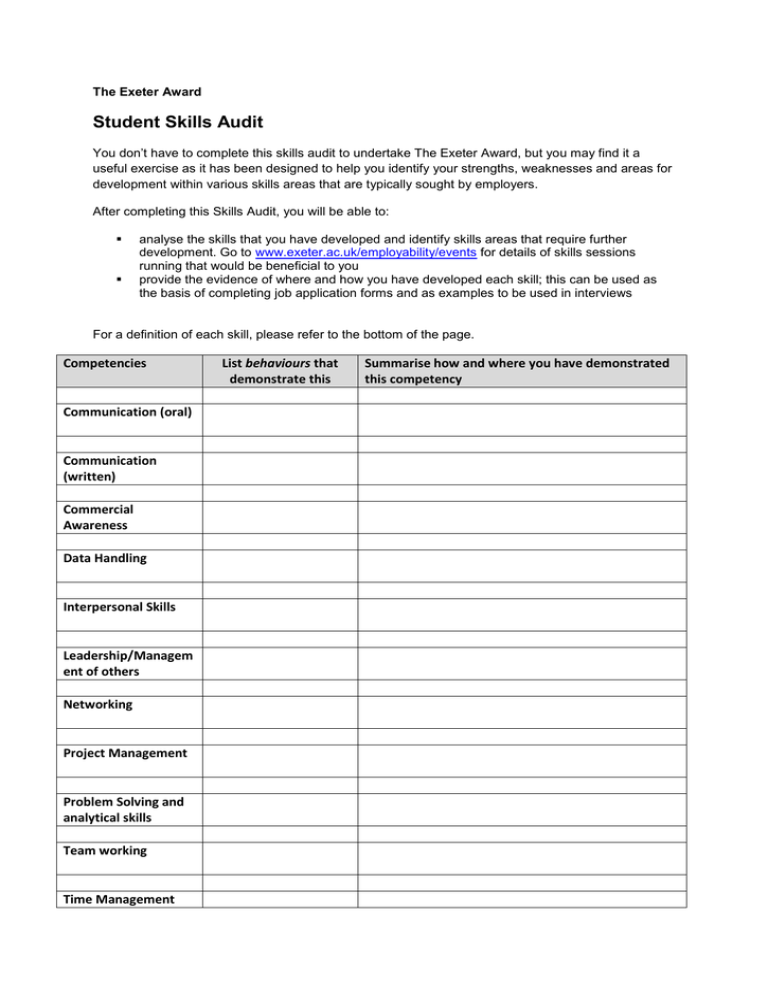Skills Audit Document
advertisement

The Exeter Award Student Skills Audit You don’t have to complete this skills audit to undertake The Exeter Award, but you may find it a useful exercise as it has been designed to help you identify your strengths, weaknesses and areas for development within various skills areas that are typically sought by employers. After completing this Skills Audit, you will be able to: analyse the skills that you have developed and identify skills areas that require further development. Go to www.exeter.ac.uk/employability/events for details of skills sessions running that would be beneficial to you provide the evidence of where and how you have developed each skill; this can be used as the basis of completing job application forms and as examples to be used in interviews For a definition of each skill, please refer to the bottom of the page. Competencies Communication (oral) Communication (written) Commercial Awareness Data Handling Interpersonal Skills Leadership/Managem ent of others Networking Project Management Problem Solving and analytical skills Team working Time Management List behaviours that demonstrate this Summarise how and where you have demonstrated this competency Attributes Confidence Cultural sensitivity Customer focus Decision making Empathy Enterprise Flexibility Honesty Initiative Organisational adaptability Proactivity Reliability Resilience Responsibility Trustworthiness List behaviours that demonstrate this Summarise how and where you have demonstrated this attribute Communication (oral) The ability to communicate clearly verbally, with a level of formality appropriate to the context. Communication (written) The ability to express ideas clearly and in a grammatically correct and appropriate form in writing, adapting the style to the occasion (including email and letter etiquette). Commercial Awareness The ability to understand the economic factors and priorities facing a particular business and its’ competitors. It can also involve improving quality and working to reduce costs. Cultural Sensitivity The ability to understand that cultural differences and similarities exist without assigning values Customer focus The ability to provide and maintain the highest standards of service for customers, to deal with customers professionally and resolve any issues in the best way for all parties. Data Handling The ability to collect and record data, and interpret and present the data using appropriate media and technology. Decision making The ability to select the best course of action to achieve the desired outcome. Empathy The capacity to recognize emotions that are being experienced by another. Enterprise The ability to be creative and innovative and the ability to show initiative to turn ideas into action. Flexibility The ability to modify your behaviour or decisions in line with the needs of the particular circumstance. Initiative The ability to act before prompted by others or taking a fresh approach with energy and enthusiasm to pursue a project; ability to set an agenda and initiate new developments Interpersonal skills The ability to relate well to others, to persuade and influence and to establish good working relationships. Leadership/Management of others The ability to motivate, encourage and support others whilst taking the lead. Networking The ability to speak to others confidently and building rapport in order to elicit information and develop useful contacts. Organisational Adaptability The ability to adapt to the requirements of an institution or organisation; ability to comply with rules and codes of behaviour and to be in tune with a job and institutional culture. Project Management The ability to set priorities, co-ordinate activities and manage resources to achieve the successful completion of a specific goal or project. Problem Solving and analytical skills The ability to define the problem, identify and implement a solution and evaluate the outcome against agreed criteria for success. Thinking things through in a logical way in order to determine key issues. This also involves the ability to grasp and think through issues quickly and to see all sides of an argument. Reliability The ability to perform your required functions to a specified timeframe. Resilience The ability to of an individual to adapt to stress and adversity and rise above it with ease. Responsibility The ability to be left accountable for work and the confidence to take the lead on projects. Team working The ability to work with others to achieve a collective goal, ensuring clear responsibilities and tasks and the ability to adapt to the needs of the group, ie, take the initiative and lead or delegate and stand back, negotiate and support others. Time management The ability to organise one’s time effectively and meet deadlines under pressure; ability to adapt one’s working methods to deal with pressure.

